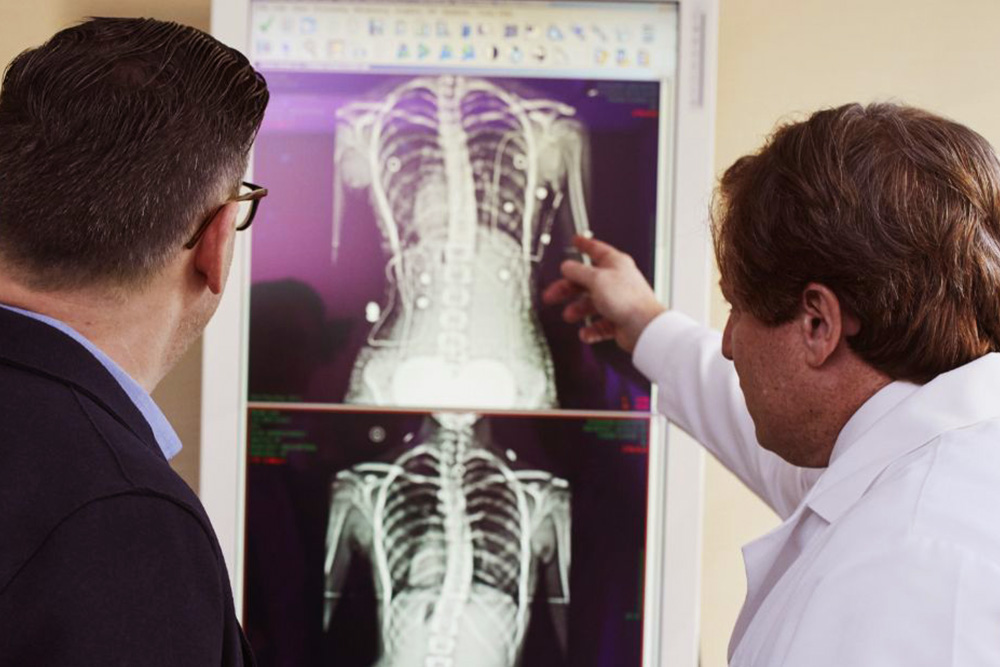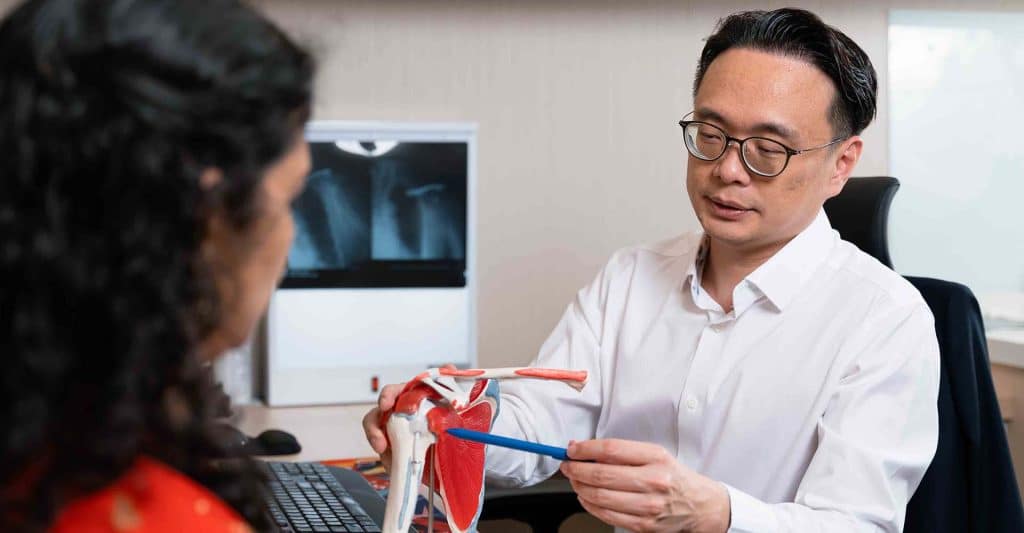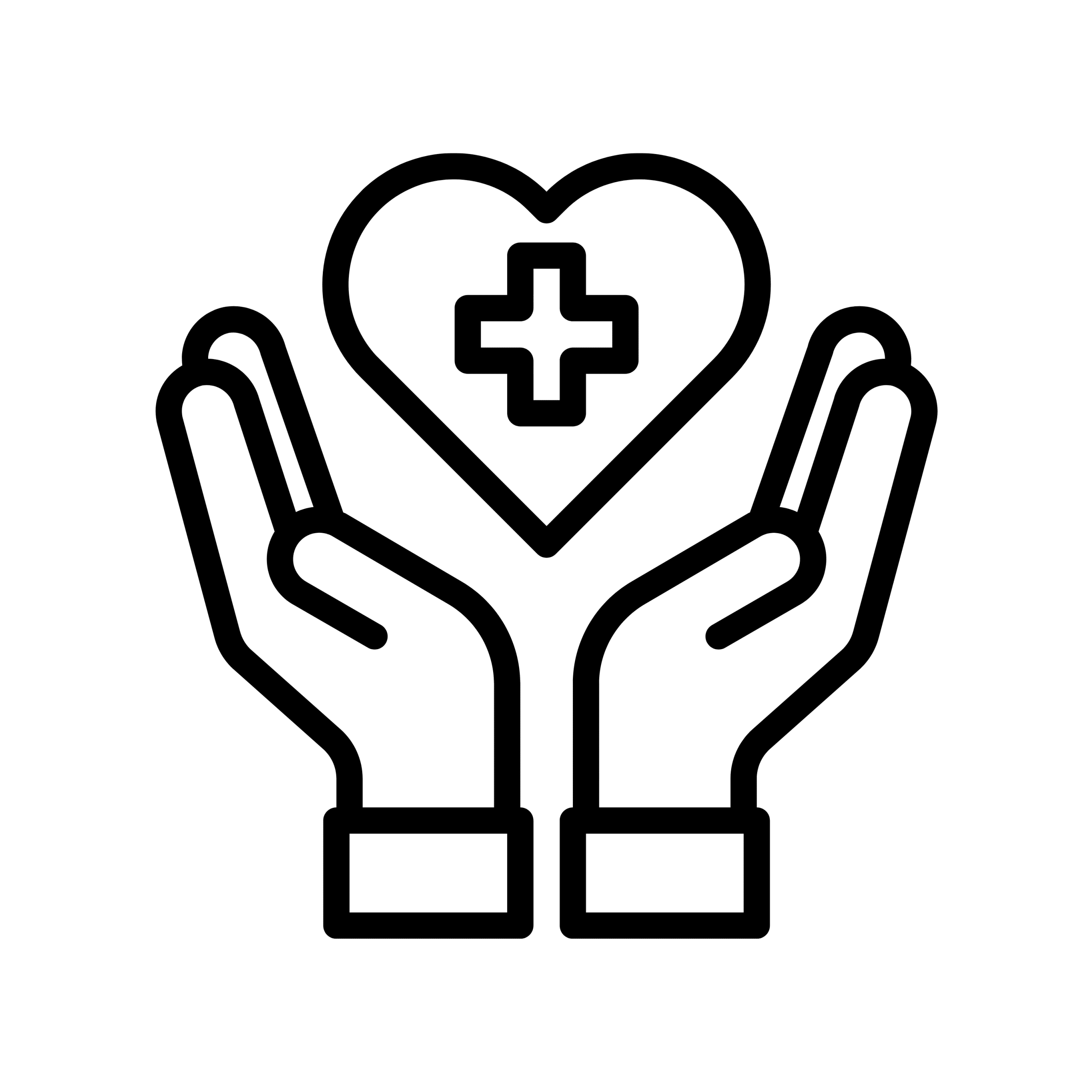Regain your shoulder mobility with tailored care for frozen shoulder and stiffness
Specialised care by Dr Chew Chee Ping at Alpha Joints & Orthopaedics
What Is Frozen Shoulder?
And Why Does It Cause Stiffness
Frozen shoulder, also known as adhesive capsulitis, is a condition that causes pain, stiffness, and reduced movement in the shoulder joint. It happens when the capsule around the shoulder joint thickens and tightens, making it difficult to move the shoulder normally.
This condition often develops gradually, worsens over time, and may take months to years to fully recover. It can occur after an injury, surgery, or long periods of immobility.
Frozen shoulder is generally divided into two categories:
- Primary Frozen Shoulder
The cause of this type is not clearly understood, research indicates that individuals with diabetes are more likely to develop primary frozen shoulder. - Secondary Frozen Shoulder
This form occurs when there is an identifiable trigger, such as an injury, fracture, tendon damage, or surgery around the shoulder. These structural changes can lead to stiffness and restricted movement in the joint.


Stages of a frozen shoulder
Frozen shoulder consists of three stages:
Shoulder pain gradually increases, and movement becomes limited. This stage usually lasts between 2 to 9 months.
Pain may lessen, but stiffness and restriction in movement become more severe, making daily activities difficult. This stage can last from 4 to 12 months.
Shoulder movement slowly improves, and pain continues to decrease. Recovery during this stage can take 5 to 24 months.
Common Signs of Frozen Shoulder also include
- Difficulty performing normal shoulder movements
- Pain and stiffness in the shoulder joint
- Pain extending to the upper arm
- Reduced range of motion
- Trouble sleeping on the affected side A grinding or clicking sensation when you move your shoulder
It is important to see a doctor as soon as you notice symptoms so they can provide an accurate diagnosis and help manage your pain with appropriate treatment
Risk Factors
- Most common in adults over 40 years old
- Women are more likely to be affected than men
Long periods of shoulder immobility can raise the risk, such as after:
- Injury or trauma (e.g. fracture)
- Shoulder or arm surgery
- Stroke or other conditions that limit movement
People with certain medical conditions have a higher risk, including:
- Diabetes
- Thyroid disorders (both overactive and underactive)
- Cardiovascular disease
- Parkinson’s disease
Maintaining gentle movement and early treatment after injury or surgery can help reduce the risk of developing frozen shoulder.


Diagnosis And Your Treatment Options
Frozen shoulder is diagnosed through a combination of physical examination and imaging tests.
Your doctor will assess your shoulder’s range of motion in two ways:
- Asking you to move your arm to observe your active movement.
- Gently moving your arm for you to check passive movement. This helps identify how much stiffness or restriction is present.
X-rays are often done to rule out other possible causes of shoulder pain, such as arthritis. Additional imaging, like MRI or ultrasound, may be used to detect issues such as rotator cuff injuries or other structural problems.
Non-Surgical Treatment for Frozen Shoulder include:
- Hot or cold compresses to ease discomfort and stiffness.
- Pain relief medications such as non-steroidal anti-inflammatory drugs (NSAID’s) used to reduce pain and inflammation.
- Steroid injections to manage severe pain and swelling.
- Hydrodilatation a minimally invasive procedure in which a fine needle is inserted into the shoulder joint under ultrasound or X-ray guidance. A mixture of corticosteroid, local anaesthetic, and sometimes sterile saline is then injected to gently stretch and expand the joint capsule, helping to relieve pain and improve shoulder movement.
- Physiotherapy and home exercises to gradually restore range of motion and shoulder strength.
Surgical Treatment Options include:
If non-surgical treatments are not effective, surgery may be considered. Common procedures include:
- Manipulation under anaesthesia: The doctor gently moves the shoulder beyond its current limits while you are under general anaesthesia to break up tight tissues and increase mobility.
- Shoulder arthroscopy: Small incisions are made to insert instruments that carefully release the tight shoulder capsule.
Meet Our Doctor
Dr Chew Chee Ping
Senior Consultant Orthopaedic Surgeon
Dr Chew Chee Ping is an orthopaedic surgeon who specializes in shoulder pain and treatment. With extensive experience and a dedication to patient care, Dr Chew works to provide patients with effective and lasting relief from shoulder pain.
Meet Our Doctor
Dr Chew Chee Ping
Senior Consultant Orthopaedic Surgeon
Dr Chew Chee Ping is an orthopaedic surgeon who specializes in shoulder pain and treatment. With extensive experience and a dedication to patient care, Dr Chew works to provide patients with effective and lasting relief from shoulder pain.

Why Choose Alpha Joints & Orthopaedics?

Personalised treatment for patients
of all ages

Commitment to exceed
patient expectation

Conveniently located in Farrer Park, Gleneagles, Novena and Orchard
Frequently Asked Questions
After surgery, recovery usually takes between 6 weeks to 3 months. Physiotherapy is essential during this period to maintain mobility and strengthen the shoulder. Most patients experience significant pain relief and improved range of motion after treatment.
While frozen shoulder cannot always be prevented, its complications can be reduced through regular exercise and proper shoulder care. Performing your prescribed stretches and mobility exercises consistently can help maintain flexibility and limit stiffness.
If you have had a recent shoulder injury or surgery, keeping your shoulder joint moving as much as possible during recovery can help lower the risk of developing frozen shoulder.
No, frozen shoulder is not usually permanent. While pain may ease over time, stiffness can remain without treatment. With early care, most people recover full movement within about a year.
Frozen shoulder usually causes a dull, aching pain in the shoulder and upper arm muscles. The pain often worsens at night, making it hard to sleep. As the shoulder capsule tightens, movement becomes increasingly restricted, leading to stiffness and discomfort during daily activities.
If you experience shoulder pain or stiffness, it’s best to consult a doctor for a proper diagnosis.
Get Back to Doing What You Love
Back pain shouldn’t hold you back. Reach out today to book an appointment with Dr Fong Poh Ling at Alpha Joints & Orthopaedics. Begin your journey to a pain-free and active life.
Send us your enquiry – Our responsive team prioritises fast replies and aim to schedule appointments within the same week whenever possible.






